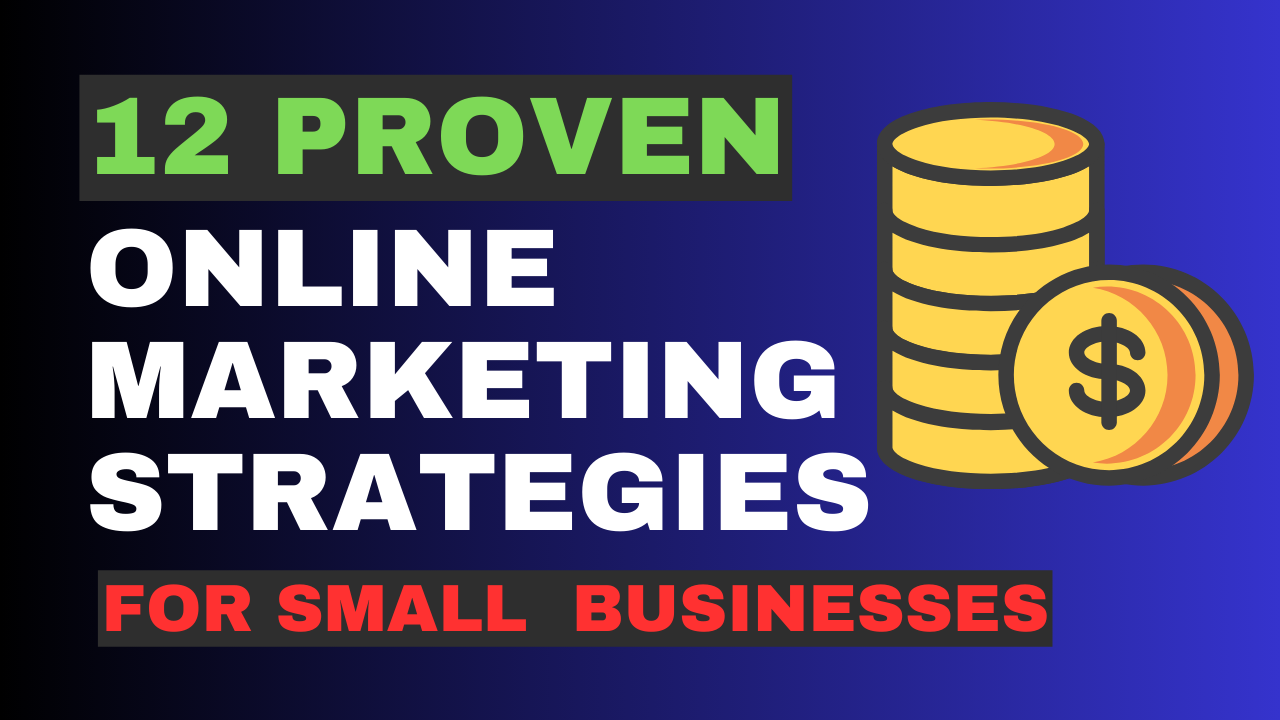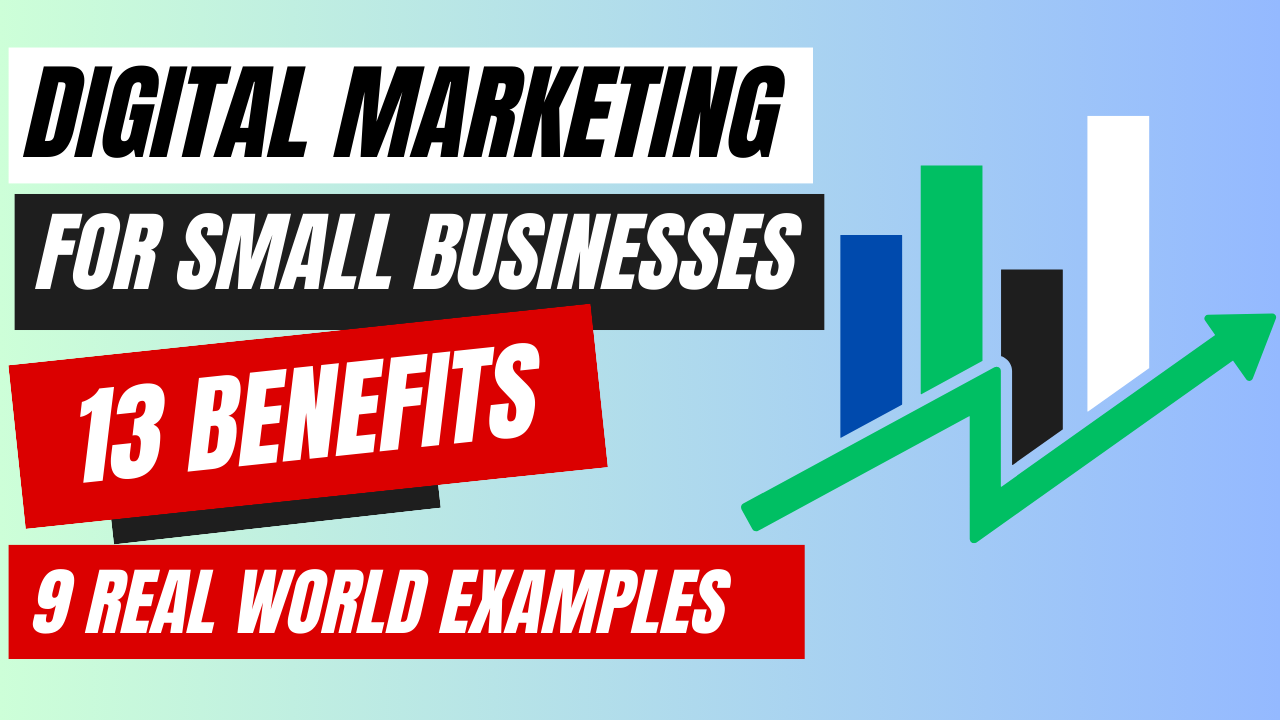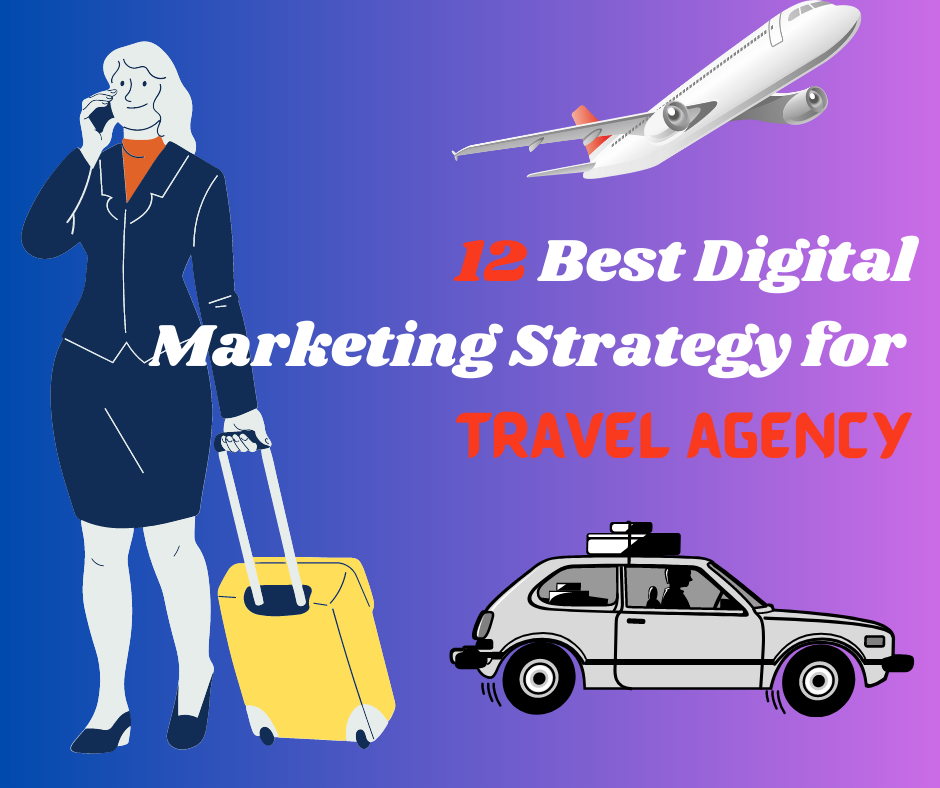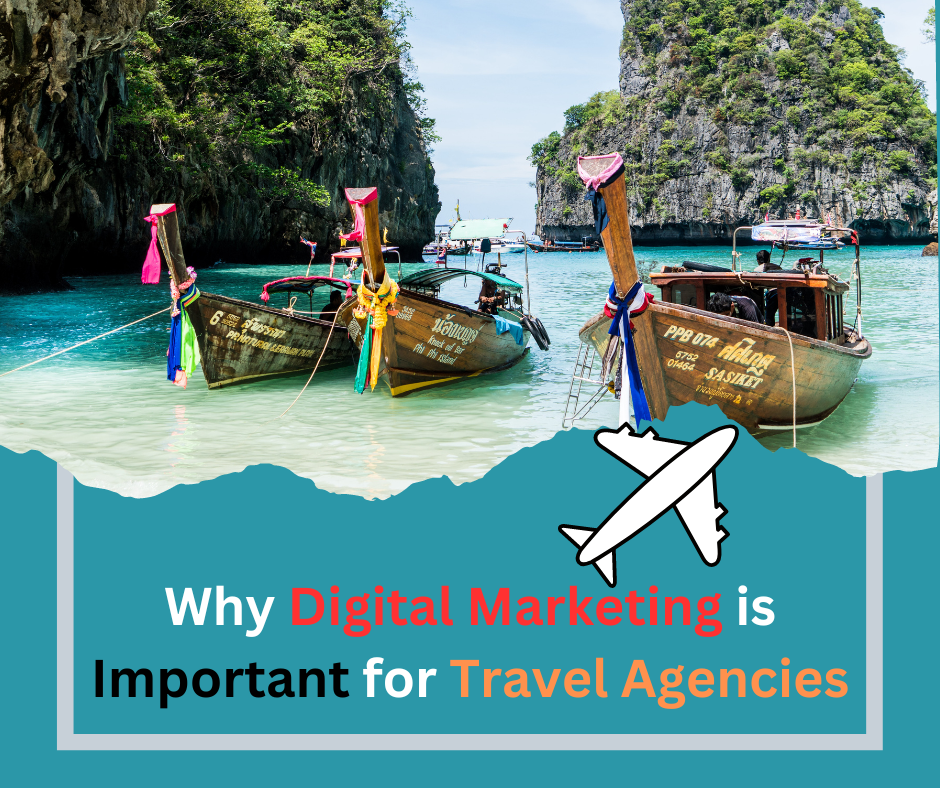Updated 21st October 2023
In today’s digital age, online marketing strategies have become a crucial component of any small business’s marketing plan. Small businesses, in particular, can benefit significantly from harnessing the power of the internet to reach a wider audience and compete with larger competitors.
In this article, we will explore effective digital marketing strategies tailored to the needs and budget constraints of small businesses. From optimizing your website to engaging with your target audience on social media, we’ll cover it all.
12 Best Online Marketing Strategies for Small Businesses

There are many online marketing strategies that small businesses can use to reach their target audience and grow their business. Here are 12 most effective online marketing strategies for small businesses:
1. Introduction
Small businesses face unique challenges in the competitive world of online marketing. Limited budgets and resources can make it difficult to stand out. However, with the right strategies in place, small businesses can thrive in the digital landscape.
2. Website Optimization
2.1. Mobile Responsiveness: In today’s mobile-first world, having a website that is optimized for mobile devices is non-negotiable. Mobile users should have a seamless experience when visiting your site, or they may quickly bounce to a competitor’s site.
2.2. SEO (Search Engine Optimization): Optimizing your website for search engines is essential for increasing organic traffic. Research relevant keywords and incorporate them into your content and metadata to improve your website’s visibility on search engine results pages (SERPs).
2.3. User-Friendly Design: A user-friendly website design ensures that visitors can easily navigate your site, find information, and make purchases. A clutter-free and intuitive design can significantly impact user satisfaction.
3. Content Marketing
3.1. Blogging: Blogging allows you to share valuable information with your audience, establish authority in your industry, and improve your website’s SEO. Regularly publish informative and engaging blog posts.
3.2. Video Marketing: Video content is increasingly popular. Create videos that showcase your products or services, share customer testimonials, or provide helpful tutorials.
3.3. Infographics: Infographics are a visually appealing way to present complex information. Use them to simplify data and make it more shareable on social media.
4. Social Media Marketing
4.1. Choosing the Right Platforms: Not all social media platforms are suitable for every business. Research where your target audience spends their time and focus your efforts there.
4.2. Consistent Posting: Maintain a regular posting schedule to keep your audience engaged and informed about your products or services.
4.3. Engaging Content: Interact with your followers by responding to comments and messages promptly. Share user-generated content to build trust.
5. Email Marketing
5.1. Building a Subscribers’ List: Collect email addresses through your website and other marketing channels. Offer incentives like discounts or valuable content to encourage sign-ups.
5.2. Personalized Content: Segment your email list and send personalized messages that cater to the recipient’s interests and preferences.
5.3. Automated Campaigns: Use email marketing automation to send targeted messages at the right time, such as welcome emails, abandoned cart reminders, and follow-ups.
6. Pay-Per-Click (PPC) Advertising
6.1. Google Ads: Google Ads can be an effective way to reach potential customers when they search for products or services related to your business.
6.2. Facebook Ads: Facebook Ads allow you to target specific demographics and interests, making it a valuable tool for small businesses.
6.3. Budget Management: Set a clear budget for your PPC campaigns and regularly monitor their performance to ensure you’re getting a positive ROI.
7. Online Reviews and Reputation Management
7.1. Encouraging Customer Reviews: Encourage satisfied customers to leave reviews on platforms like Google My Business and Yelp. Positive reviews can boost your credibility.
7.2. Responding to Feedback: Address negative reviews professionally and promptly. Show that you value customer feedback and are committed to resolving issues.
8. Analytics and Data Tracking
8.1. Google Analytics: Use Google Analytics to track website traffic, user behavior, and conversion rates. This data will help you make informed marketing decisions.
8.2. Social Media Insights: Most social media platforms offer insights into your post performance and audience demographics. Use this information to refine your social media strategy.
8.3. Email Campaign Metrics: Monitor open rates, click-through rates, and conversion rates for your email campaigns to assess their effectiveness.
9. Networking and Partnerships
9.1. Joining Local Business Groups: Networking with other local businesses can lead to collaborations and referrals. Attend local events and join online forums or groups.
9.2. Collaborating with Influencers: Partnering with influencers in your niche can expand your reach and introduce your products or services to a broader audience.
9.3. Cross-Promotions: Consider cross-promotions with complementary businesses to tap into each other’s customer bases.
10. E-commerce Strategies
10.1. Online Marketplaces: If applicable, consider selling your products on popular online marketplaces like Amazon or eBay to reach a broader customer base.
10.2. Shopping Cart Optimization: Streamline the online purchasing process to reduce cart abandonment rates. Ensure a secure and user-friendly checkout experience.
10.3. Customer Support: Provide excellent customer support, including easy returns and responsive communication, to build trust with online shoppers.
11. Budget-Friendly Tools and Resources
11.1. Free SEO Tools: Take advantage of free or affordable SEO tools to help with keyword research, site audits, and competitor analysis.
11.2. Social Media Scheduling: Use scheduling tools to plan and automate your social media posts, saving you time and ensuring consistency.
11.3. Email Marketing Platforms: Explore budget-friendly email marketing platforms that offer templates and automation features.
12. Measuring ROI (Return on Investment)
Track the performance of your marketing efforts by calculating the ROI for each strategy. Focus on those that provide the best return on investment.
What are the strategies of online marketing for small business?
Online marketing is a crucial strategy for small businesses, enabling them to harness the power of the internet to connect with their target audience, generate leads, and boost sales. There are several effective channels and techniques that small businesses can utilize in their online marketing efforts, including:
- Search Engine Optimization (SEO): Improve your website’s search engine ranking by optimizing content, titles, and meta descriptions with relevant keywords.
- Content Marketing: Create and distribute valuable, consistent content through blog posts, articles, infographics, e-books, and more to engage and retain your audience.
- Social Media Marketing: Utilize social media platforms to connect with potential and existing customers by sharing engaging content, running ads, and participating in conversations.
- Email Marketing: Send regular emails to subscribers for business updates, product promotions, and customer relationship nurturing.
- Paid Advertising: Display ads to potential customers through online advertising platforms like search engine ads and social media advertising.
- Influencer Marketing: Partner with influencers to promote your products or services to their engaged audience.
- Local Marketing: Promote your business to local customers using online directories, SEO, and other methods.
Your choice of online marketing strategy should align with your specific goals, budget, and target audience. Regardless of the strategy, here are some essential tips for small businesses in online marketing:
Here are some additional tips for small businesses when it comes to online marketing:
- Set clear goals: What do you want to achieve with your online marketing efforts? Do you want to increase website traffic, generate leads, or boost sales? Once you know your goals, you can tailor your strategies accordingly.
- Track your results: It’s important to track the results of your online marketing campaigns so you can see what’s working and what’s not. This will help you optimize your campaigns and get the most out of your investment.
- Be patient: Online marketing takes time to see results. Don’t expect to overnight success. Just keep at it and you will eventually see results.
Key Statistics related to Online Marketing Strategies for Small Businesses
Here’s a table that summarizes some key statistics related to online marketing strategies for small businesses:
| Online Marketing Strategy | Average ROI | Customer Engagement | Cost-effectiveness |
|---|---|---|---|
| SEO | 2,800% | High | High |
| Content Marketing | 200% | Moderate to High | Moderate |
| Social Media Marketing | 95% | High | High |
| Email Marketing | 3,800% | High | Very High |
| PPC Advertising | 200-300% | Moderate | Moderate to High |
| Online Reviews Management | N/A | High | High |
| Mobile Responsiveness | N/A | N/A | High |
| Video Marketing | 80% | High | Moderate to High |
Please note that these statistics are approximate and can vary based on various factors, including industry, target audience, and the specific implementation of each strategy. It’s essential for small businesses to track their own performance metrics to determine what works best for their unique circumstances.
Real-World Examples of how a Digital Marketing Agency can create effective Strategies for Small Businesses:
Certainly, let’s explore some real-world examples of how a digital marketing agency can create effective strategies for small businesses:
1. Local SEO for a Neighborhood Coffee Shop:
Imagine a small neighborhood coffee shop looking to increase its foot traffic and online visibility. A digital marketing agency would start by optimizing the coffee shop’s website for local SEO. They would include location-specific keywords in the website content and meta tags, ensuring that when someone searches for “best coffee shop near me,” this coffee shop appears in the search results.
Additionally, the agency might create and optimize a Google My Business profile, encouraging customers to leave positive reviews. They could also run targeted social media campaigns promoting daily specials and events at the coffee shop, leveraging platforms like Instagram and Facebook to engage with the local community.
Note: Local SEO is essential for small businesses like neighborhood coffee shops because it helps them compete with larger chains. When the coffee shop appears prominently in local search results, it attracts nearby customers who are more likely to visit in person. Positive reviews and engagement on social media also build trust within the community.
2. Content Marketing for a Boutique Clothing Store:
A boutique clothing store catering to a niche market may seek to establish itself as a fashion authority. The digital marketing agency would develop a content marketing strategy, creating regular blog posts about fashion trends, styling tips, and interviews with local designers.
The agency might also produce visually appealing lookbooks and share them on social media platforms like Pinterest and Instagram to showcase the boutique’s unique offerings. By consistently providing valuable content and engaging with fashion enthusiasts on social media, the boutique can build a loyal online following and drive traffic to its website.
Note: Content marketing is crucial for boutique clothing stores as it positions them as experts in their niche. By offering valuable fashion insights and showcasing their unique style, the store can differentiate itself from larger retailers. Engaging content also fosters a sense of community and loyalty among fashion-savvy customers.
3. E-commerce Expansion for a Handmade Jewelry Maker:
Let’s say a small artisanal jewelry maker wants to expand their online sales. The digital marketing agency would begin by optimizing the maker’s website for e-commerce. They might recommend a user-friendly platform like Shopify or WooCommerce to showcase the jewelry and facilitate online purchases.
The agency could then create visually stunning product listings, write compelling product descriptions, and implement SEO techniques to rank for relevant jewelry-related keywords. Additionally, they might recommend running Google Shopping ads to increase the visibility of the jewelry in search results.
Note: Expanding into e-commerce is a strategic move for small artisanal businesses. It opens up a global market and allows them to reach customers beyond their physical location. Effective e-commerce strategies not only increase sales but also provide valuable insights into customer preferences and behavior.
4. Social Media Engagement for a Local Gym:
A local gym wants to boost membership and engage with its members online. The digital marketing agency would focus on creating a strong social media presence. They might post regular updates on Facebook and Instagram, showcasing member success stories, workout tips, and behind-the-scenes glimpses of the gym’s atmosphere.
To encourage engagement, the agency could run social media contests, asking members to share their fitness achievements or favorite gym moments. By fostering a sense of community and using social media as a platform for motivation and support, the gym can attract and retain members.
Note: Social media is a powerful tool for local businesses like gyms. It allows them to connect with members on a personal level, reinforcing their commitment to health and fitness goals. Social media contests and community-building initiatives can foster a loyal customer base and encourage word-of-mouth referrals.
5. Email Marketing for a Family-Owned Restaurant:
A family-owned restaurant wants to keep its loyal customers informed about special promotions and events. The digital marketing agency would suggest implementing an email marketing strategy. They might collect customer email addresses through the restaurant’s website and in-person visits.
The agency could send out weekly newsletters with updates on new menu items, upcoming themed nights, and exclusive discounts for subscribers. By consistently reaching out to their customer base via email, the restaurant can maintain strong customer relationships and drive repeat business.
Note: Email marketing is a cost-effective way for restaurants to maintain customer relationships. Regular newsletters keep customers informed and engaged, making them more likely to return for special promotions and events. It’s also an excellent channel for collecting feedback and adapting the menu to customer preferences.
In each of these real-world examples, the digital marketing agency tailors their strategies to the unique needs and goals of the small business. Whether it’s optimizing for local search, content marketing, e-commerce, social media engagement, or email marketing, the key is to align the strategy with the business’s objectives and target audience to achieve maximum impact within their budget constraints.
- Airbnb: Airbnb is an online marketplace for booking accommodations. The company’s digital marketing agency developed a strategy that focused on user-generated content (UGC). Airbnb encouraged its hosts and guests to share their travel experiences on social media, which helped to create a sense of community and excitement around the brand.
- Nike: Nike is a sportswear company that uses a variety of digital marketing strategies to reach its target audience. The company’s digital marketing agency creates engaging content on social media, runs paid advertising campaigns, and partners with influencers to promote its products.
- Starbucks: Starbucks is a coffeehouse chain that uses digital marketing to drive traffic to its stores. The company’s digital marketing agency creates targeted ads on social media, runs email marketing campaigns, and offers loyalty programs to its customers.
- Netflix: Netflix is a streaming service that uses digital marketing to acquire new subscribers and keep existing subscribers engaged. The company’s digital marketing agency creates personalized recommendations, runs social media contests, and partners with other brands to promote its services.
- Amazon: Amazon is an e-commerce company that uses digital marketing to drive sales. The company’s digital marketing agency creates product listings, runs paid advertising campaigns, and uses email marketing to reach its customers.
These are just a few examples of how digital marketing agencies can help small businesses reach their target audience and achieve their goals. The specific strategies that are used will vary depending on the business, its goals, and its budget.
Here are some additional things to keep in mind when working with a digital marketing agency:
- Make sure the agency has experience working with small businesses. Not all digital marketing agencies are created equal. Some agencies specialize in working with large businesses, while others focus on small businesses. It’s important to find an agency that has experience working with businesses of your size and industry.
- Get clear on your goals. Before you work with an agency, it’s important to have clear goals for your online marketing. What do you want to achieve? Do you want to increase website traffic, generate leads, or boost sales? Once you know your goals, you can work with the agency to develop a strategy to achieve them.
- Be prepared to invest. Online marketing can be an effective way to reach your target audience and grow your business. However, it’s important to be prepared to invest in your marketing efforts. The amount of money you need to invest will vary depending on your goals and budget.
- Be patient. Online marketing takes time to see results. Don’t expect to see overnight success. Just keep at it and you will eventually see results.
If you’re new to online marketing, it can be helpful to work with a digital marketing company like Mercatodigi. A good company can help you develop a strategy that is right for your business and implement it effectively.
Also Read: Digital Marketing for Small Businesses | 13 Benefits | 9 Real World Examples
Conclusion
Online marketing offers a world of opportunities for small businesses to thrive and grow. By implementing the strategies outlined in this article, you can enhance your online presence, connect with your target audience, and achieve your business goals.
FAQs
How can I effectively manage my online reviews as a small business owner?
Respond promptly to reviews, both positive and negative. Showcase your commitment to customer satisfaction.
What social media platforms are best for small businesses?
It depends on your target audience. Research where your audience spends their time and focus your efforts there.
Is email marketing still relevant for small businesses in the age of social media?
Absolutely! Email marketing allows you to engage directly with your audience and deliver personalized content.
How can I measure the success of my online marketing campaigns?
Use tools like Google Analytics and social media insights to track key performance metrics.
Are there any free tools to help with online marketing for small businesses?
Yes, there are many free and affordable tools available for tasks like SEO, social media scheduling, and email marketing.





